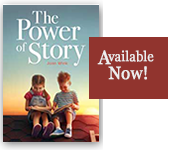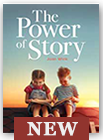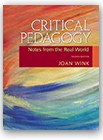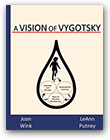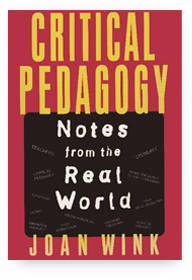pp. 7-11
by Joan Wink
Published by Libraries Unlimited/ABCLIO
Copyright © 2018 by Joan Wink
Steve Stories: Does Real Reading Really Help Reading?
For years, I’ve run around the country for speaking engagements, but I always seem to have a Steve story, based on the work of Steve Krashen, who has had such a profound effect on my understandings of language acquisition, languages, and literacy. It is easy to have a Steve story, as not only is his academic contribution wide and deep, but he’s also funny and fun. Did I mention that he plays a mean piano and is a black belt in a form of martial arts? But, I digress—back to our question: Does real reading really help reading? Yes. Steve Krashen has provided data for decades on this topic and is presently writing letter after letter to editors, as he competes for the most letters-to-the-editor published. Presently, he is in second place, behind only Subhash Chandra Agrawal from India. See, I told you that it was easy to tell Steve stories.… However, nowhere does he answer this question better that in his book, The Power of Reading. It will be very helpful if you know that book before reading this one. Here’s a book review by Deb Harrison, a teacher in Wyoming.
Steve Answers the Question
Krashen, Stephen. (2004). The Power of Reading: Insights from the Research. Westport, Connecticut: Libraries Unlimited. 199 pages. ISBN 1-59158-169-9 For information and ordering: www.lu.com.
A Book Review by Debra Harrison, M.Ed., Teacher, Crook County School District #1, Moorcroft Secondary, Moorcroft, WY, 82721.
The Power of Reading by Stephen Krashen focuses on Krashen’s concept of Free Voluntary Reading (FVR). FVR allows readers to read what they want without questions, tests, or looking up words in the dictionary. If the reader does not like what they are reading they put down that book and find another one. FVR provides language input, which produces advanced levels of language acquisition leading to better comprehension and communication skills.
Stephen Krashen is professor emeritus at the University of Southern California, who moved from the linguistics department to the faculty of the School of Education in 1994. He is a linguist, educational researcher, and activist. His research in this book offers a common sense approach to literacy. Reading is the only way to improve literacy.
Introduction: In his introduction to The Power of Reading, Krashen explains the day he first heard there was a literacy crisis. It was 1987; he was watching the Oprah Winfrey show that had six “illiterates” as guests of the show. These guests all claimed to have slipped through the cracks in school by learning advanced coping mechanisms. Krashen theorizes that most people are literate enough to read and write, but if they aren’t readers, they will not have the high level of skills needed to meet the demands of the world today. His position is definitive: the only way to reach the higher levels of education is through reading: Free Voluntary Reading, no tests, no book reports, and the ability to put down a book if it isn’t interesting and choose a different one.
Chapter 1, “The Research,” Krashen begins the chapter with the position that “FVR is one of the most powerful tools we have in language education … FVR is the missing ingredient in first language ‘language arts’ instruction” (pg. 1).
In school free reading programs provide some of the clearest evidence for the power of reading. Numerous studies have shown that readers do as well or better than students who were involved in traditional methods that include assigned reading and direct instruction in grammar, vocabulary, reading comprehension, and spelling. Numerous studies and tests show that reading improves vocabulary and spelling.
In the second section of “The Research” chapter, Krashen discusses direct instruction as an alternative to free reading. There are several explanations as to why direct instruction is inferior to free reading but the concept is simple; language is too complex to be learned by specific rules through memory. The pleasure of reading leads to the acquisition of language in a context that makes language more accessible.
Chapter 2, “The Cure,” focuses on the power of reading. The most important aspect of reading is access. Without access to a large variety of books, magazines, comic books or other reading materials the power of reading cannot be achieved. More access at home results in better reading. The same holds true for better libraries at home, better school libraries and access to public libraries. Just providing access isn’t enough. Through the compilation of data, Krashen and his team studied the factors that predicted better reading comprehension scores. Through these studies there were four factors that stood out: (a) Poverty had a very strong negative factor, the higher the level of poverty, the lower the scores. (b) Silent Sustained Reading (SSR) proved that the more students read, the better they scored. (c) School libraries with at least 500 books had a strong positive factor, nearly as strong as poverty. This factor strongly suggested that supplying books in a school or library can offset the negative effects of poverty on reading comprehension tests. Finally, (d) data indicate that actual reading instruction was a negative factor.
Readers need a comfortable and quiet spot to read. Libraries seem to be the most likely place for this to happen without all of the distractions that come at school or home. In spite of these factors, just because students have access does not mean they will read. To get students reading they need only to find one book that interests them, according to Krashen. Once they are interested, they will continue to read. Several studies, including one by Lance, Welborn, and Hamilton-Pennell (1993), as well as Krashen (1995) confirmed that “money invested in school libraries was associated with high reading scores, even when factors such as poverty and availability to computers were controlled” (pg. 66).
Chapter 3, “Other Issues and Conclusions,” addresses the fact that “massive free voluntary reading” cannot address all gaps in comprehension. Spelling demons, punctuation, and grammar trip up the best of readers due to the arbitrary nature of English. Krashen goes on to explain that these gaps have very little effect on avid readers due the fact that they do not read every detail.
Writing
Krashen also attributes better writing as a result of reading. Many researchers have proven that reading input provides the structure and context needed to become a better writer. “Hypothesizing that writing style comes from reading, not writing, is consistent with what is known about language acquisition: Language acquisition come from input, not output, from comprehension, not production” (p. 136). Although writing does not develop writing style, it does allow us to communicate with others. It also allows us to stimulate and clarify thinking.
Television
There is an assumption that television has a negative impact on reading because it replaces valuable reading time. Several of the studies Krashen discusses allow that only when television watching is excessive is it a negative. Television also lends very little to language acquisition due to the lack of impressive vocabulary, but in some studies, television seemed to encourage reading.
Second-language Acquirers
Reading in the first language helps develop knowledge. The more knowledge gained through reading, the easier it is to read in the second language. Reading in their primary language allows language learners to continue to grow and develop in their heritage language (HL) as this is very difficult to do when living in a different country.
Krashen’s conclusions simply assert that when children read for pleasure they acquire knowledge. When they love reading, and do it avidly, they “involuntarily and without conscious effect” acquire language.
The Power of Reading has a vast selection of references throughout for continued exploration and professional growth. Ironically, the reading of this book has provided valuable insight concerning reading. For English content teachers it is often common knowledge that the more a student reads, the better he or she is at writing. This book emphasizes that point with strong evidence to back it up. The Power of Readingcombines common sense practice with academic evidence. It is important that students be allowed access to books, as well as time to read. The evidence presented in this book proves that FVR is a powerful tool.
